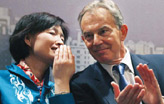Politics
World calls for ceasefire, political solution in Libya
Updated: 2011-04-06 15:37
(Xinhua)
TRIPOLI -- Countries and regional organizations in the world are calling for immediate ceasefire and political solution in Libya, where forces loyal to Libyan leader Muammar Gaddafi and anti-Gaddafi rebels chased each other in the UN-mandated no-fly zone.
Algeria's Maghreb and Africa Affairs Minister Abdelkader Messahel Tuesday reiterated, "We endorse an immediate cease fire, as proposed by the African Union in its road map."
"We believe that political option remains the best remedy for the Libyan crisis," Messahel told a press conference in Algiers after meeting visiting British Minister for Middle East and North Africa Affairs Alistair Burt.
Messahel stressed that "the use of force would only delay the restoration of stability in this brotherly country, and there will certainly be repercussions on stability and security of the region."
Italian Foreign Minister Franco Frattini met with visiting African Union (AU) Commission Chairperson Jean Ping in Rome on Tuesday to discuss the situation in Libya and Cote d'Ivoire.
Frattini and Jean Ping both agreed on an urgent need to end the violence in Libya through an "effective and verifiable ceasefire" to protect civilians and create conditions for a political solution which involves an inclusive process of national reconciliation.
Frattini and Jean Ping agreed to stay in close contact to exchange views and to work together for a political solution to the crisis in Libya.
The foreign ministers of Finland, Sweden, Denmark, Norway and Iceland met in Helsinki on Tuesday to discuss matters of common interest in foreign affairs and security policy. They called for a political solution to the Libyan crisis through national dialogue.
They pointed out that efforts to find a political solution to the Libyan crisis should be enhanced through an open and broadly based national dialogue.
South African International Relations Minister Maite Nkoana-Mashabane told reporters on Tuesday in Pretoria that forces of the North Atlantic Treaty Organization (NATO) should stop their bombings to allow an African Union delegation to visit Libya to mediate a peaceful solution.
She noted that the UN Security Council resolution for establishing a no-fly zone was meant to protect civilians "and should just be that. It was never meant to support regime change."
The South African minister said that a change in Libya needed to be brought about peacefully by the Libyan people themselves.
Indonesian President Susilo Bambang Yudhoyono and visiting Turkish President Abdullah Gul voiced their support in Jakarta on Tuesday to a peaceful transition to democracy in Libya and urged to stop violence in the North African country that has killed dozens of civilians.
The two leaders told a joint press conference that immediate and right steps were needed to terminate the ongoing violence and to impose a ceasefire in accordance with UN Security Council Resolution 1973, followed by the pursuit of a peaceful political solution.
Both countries expressed their willingness to offer assistance to help end the conflict, such as diplomatic engagement, participation in any possible UN-brokered peacekeeping mission in Libya.
Russian Foreign Minister Sergei Lavrov warned on Tuesday that Russia could oppose any new resolution by the UN Security Council to use military force without clarification.
Lavrov said that Moscow did not consider UN Security Council Resolution 1973 on Libya as a precedent, insisting that the frameworks of the use of military force in conflicts would be determined more clearly in the future.
"We would not like the Security Council to decide on anything like that again, and we would like the text to be as specific as possible on who will use military force and how it will be used," Lavrov was quoted by the Interfax news agency as saying.
The Libyan government said Tuesday it was ready to negotiate reforms, but refused any talk of Gaddafi's stepping down, according to Al-Arabiya TV.
"What kind of political system is implemented in the country...is negotiable...We can have anything, elections, referendums...Gaddafi's future was non-negotiable," said Libyan Information Minister Moussa Ibrahim.
"We think he (Gaddafi) is very important to lead any transition to a democratic and transparent model," Ibrahim said.
Fierce fighting continued on Tuesday in Libya and opposition fighters launched a new attempt to recapture the oil refinery town of Brega.
Witnesses said that forces loyal to Gaddafi started Tuesday to storm into the east of the eastern oil town of Brega under heavy artillery bombardment, denying a report that NATO warplanes launched an airstrike on government troops in Brega on Tuesday.
The town, along with the eastern town of Ras Lanuf, is very significant to Libya's oil exports of 1.5 million barrels per day, which have been radically affected by the unrest since February 15.
NATO Brigadier General Mark van Uhm told a press briefing at NATO headquarters on Tuesday that since the beginning of the military campaign against Libya, 30 percent of Gaddafi's forces has been eliminated.
The officer said that all sorties over Libya were now commanded by NATO, which took over full command of military operation on March 31 from the United States.
He added that countries can still use their national military assets in support of humanitarian aids to Libya, but need to coordinate their operations with NATO.
E-paper

Green mission
Tony blair believes China will take a leading role to fight climate change and cut emissions.
The spring of new professions
Real modern times
F1 sponsors expect returns from Shanghai stop
Specials

Share your China stories!
Foreign readers are invited to share your China stories.

Have you any wool?
The new stars of Chinese animation are edging out old childhood icons like Mickey Mouse and Hello Kitty.

Fill dad's shoes
Daughter and son are beginning to take over the family business of making shoes.




